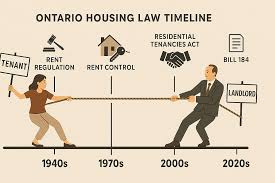The Canadian residential rental market has long been a stable and attractive option for both landlords and tenants. However, in recent years, one factor has started to cast a shadow of uncertainty over this market – high-interest rates. Rising interest rates can have a profound impact on the dynamics of the rental market, affecting both landlords and tenants in various ways.
1. Increased Costs for Landlords:
One of the most immediate consequences of high-interest rates is the increased cost of borrowing for property investors. Landlords often rely on mortgages to finance their rental properties. As interest rates rise, so do the monthly mortgage payments, cutting into landlords’ profit margins. This can lead to several outcomes, such as:
- A rise in rental rates: Landlords may be compelled to increase rent to cover the higher financing costs. This puts added financial strain on tenants, particularly those with fixed incomes.
- Decreased investment activity: High-interest rates can deter potential investors from entering the rental market, leading to a slowdown in property purchases. This can ultimately limit the supply of rental properties.
2. Tenant Affordability:
Tenants are directly affected by the cost of living in rental properties. When landlords increase rent to offset higher mortgage expenses, tenants may find it more challenging to afford their housing. This can lead to:
- Housing insecurity: Tenants might be forced to move out in search of more affordable options, leading to increased turnover and housing instability.
- Financial strain: Higher rent payments can strain tenants’ budgets, making it difficult for them to save money or invest in other areas of their lives.
3. Market Uncertainty:
High-interest rates can introduce uncertainty into the rental market. Property values may stagnate or decrease as a result of decreased investment, and potential changes in government policies to address affordability concerns can further contribute to instability.
The impact of high-interest rates on Canada’s residential rental market is complex and multi-faceted. While rising interest rates can increase costs for landlords and create affordability challenges for tenants, they also influence investment decisions and market dynamics. Striking a balance between the needs of landlords and tenants while navigating interest rate fluctuations remains a critical challenge for policymakers. Ultimately, the health of the residential rental market hinges on addressing these challenges effectively to ensure the availability of affordable, stable housing for all Canadians.
Search
Categories
Recent posts
Tags
- a louer
- affordable apartments Toronto
- affordable housing
- affordable housing solutions Canada
- Air Filters
- air quality
- apartment
- apartment close to public transport
- apartment for rent
- apartment for rent montreal
- apartment for rent Toronto
- apartment insurance
- appartement
- appliances
- ARTICLE
- available for rent
- background check
- bacteria
- best city to live in canada
- best healthcare
- bicycle
- bicycle path
- bike lane
- bike path
- bikes
- bill 16
- burglar
- buy a house
- buying a house
- carbon monoxide detector
- cars
- centris
- city
- cleaning
- cleaning products
- cleaning wood floors
- closet
- closet space
- clothing organizer
- compact rental units
- condo
- condo association laws
- condo fees
- condo for rent
- condo insurance
- construction budget
- construction contractors
- construction cost
- credit check
- decorating room
- digital transaction
- door lock
- doors
- downtown micro apartments
- electricity
- employment verification
- energy consumption
- energy cost
- energy saving
- engineered hardwood
- fire alarm
- fire detector
- fire extinguisher
- floor
- flooring
- for rent
- For rent in Montreal
- For rent in Toronto
- For rent in Vancouver
- for sale
- furniture
- gas
- healthy candles
- healthy lifestyle
- home
- house
- house for rent
- house for sale
- house garden
- house insurance
- house locks
- house plants
- immigrant
- importance of water leak detector
- indoor plants
- insurance
- intergenerational home
- intergenerational living
- interior designer
- investment
- landlord
- lease
- lease responsibility
- long term care facility
- low crime
- mattress
- micro-apartments Vancouver
- micro-units Toronto
- mls
- move to canada
- moving company
- Moving to canada
- moving truck
- multigenerational home
- multiplex
- nano-suites
- nano-suites Toronto
- new apartment
- new color
- oil
- old age home
- online house purchase
- Ontario
- paint colors
- passive income
- pet friendly apartment
- pet friendly plants
- planning for vacation
- plants
- porcelain tile
- property
- questions for apartment rental
- real estate
- real estate agent
- real estate broker
- real estate online
- real estate transaction
- realtor
- renal history
- rent
- rent an apartment
- rent control
- rent obligations
- rental
- rental board
- rental scam
- renting
- residential income
- residential lease
- residential rental
- revenue property
- safe area
- safe candle in apartment
- safe candle in house
- safe candles
- safety
- scam
- security
- sell a house
- seniors residence
- small apartments Vancouver
- smoke detector
- social media and real estate
- soy candle
- soy candles made with essential oils
- storage space
- student apartment
- student housing
- tenant
- tiny rentals Canada
- traffic
- trending color
- trending paint
- university student rental
- ventilation
- vinyl floor
- water alarm
- water damage
- water leak detector
- window frame
- window manufacturer
- windows
- wood floors



